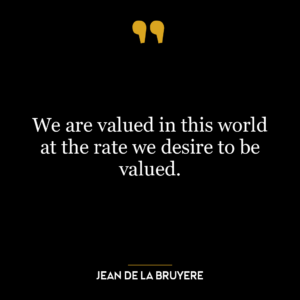The quote “Man does not only sell commodities, he sells himself and feels himself to be a commodity” is a profound reflection on the human condition within a capitalist society. It suggests that in a world driven by trade and commerce, individuals are not only selling physical goods or services, but they are also selling aspects of themselves. This could mean their time, their skills, their creativity, or even their physical labor.
The act of selling oneself can be seen in various forms of employment where individuals are paid for their abilities and talents. It could also refer to the way we present ourselves in social situations, where we ‘sell’ our personalities, our ideas, and our identities to others.
Feeling oneself to be a commodity implies that individuals might see themselves as objects of trade, with a certain value attached to them. This could lead to a sense of self-objectification, where one’s self-worth is tied to their market value. This perception can lead to a variety of psychological issues such as anxiety, depression, and low self-esteem.
In today’s world, this idea is highly relevant. In the era of social media and personal branding, people are encouraged to market themselves as commodities. We are often judged by our online presence, our followers, likes, and shares, which can be seen as a form of social currency. This can result in a pressure to constantly perform and present a perfect image of ourselves, leading to stress and mental health issues.
In terms of personal development, recognizing this tendency to commodify oneself can be the first step towards resisting it. It’s important to remember that our value as human beings is intrinsic and cannot be measured by external standards. Personal development should be about self-improvement and growth, not about increasing our market value. By focusing on cultivating our skills and passions for their own sake, rather than for how they might be perceived by others, we can find a more authentic and fulfilling path in life.








